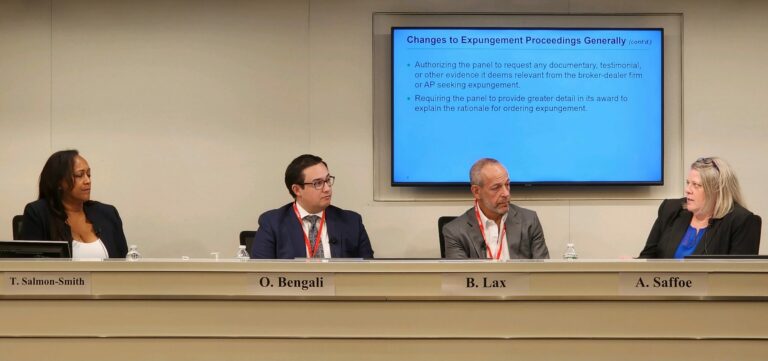ETN Investors: Skydiving Without a Parachute in COVID-19 Economic Freefall

Imagine losing more than $800,000 investing. Now, imagine losing $800,000 investing in just two weeks. Recently, The Wall Street Journal featured the story of William Mark, an investor who sought to recoup some of the losses he suffered in the financial recession of 2008. In order to turbocharge his returns, he invested in non-traditional vehicles, including exchange-traded notes, or ETNs.
While Mr. Mark enjoyed an eye-catching 18% return in the beginning, those returns evaporated once the global economy ground to a standstill in March 2019 amid the COVID-19 pandemic, and the value of his ETN investments took a freefall. Below is a brief discussion of what ETNs are, whether they are a worthwhile investment for those who are willing to take greater risk for greater return, and whether the brokers who sell them disclose just how risky of an investment they are.
What Is An Exchange-Traded Note (ETN)?
ETNs, exchange-traded notes, are unsecured debt securities that track an index. Like stocks, they are traded on a major exchange, but they are considered a bond, even though they do not make periodic interest payments like other typical bonds. The financial institution pays the investor an amount of money correlated to the performance of the index, less any fees, when the ETN matures. Since they are traded like stocks, their return is based on market index, and their exchange rate goes up and down as the market changes.
Investors make money by selling the ETN for more than they paid for it and lose money if the index decreases or does not earn more than the fees charged by the financial institution. Financial institutions have the option to remove these investments from the market if their value declines to a certain level.
Many ETNs are leveraged, meaning that they amplify gains and losses through borrowed money. ETNs’ value can be tied to the stock market, the future value of currency in other countries, wheat, oil pipeline rights, small business loans, and myriad other things.
Other external factors can also affect the value of the ETN, including the issuer’s credit rating, a financial institution’s ability to pay before defaulting on the bond and other influences, such as economic, political, legal, or regulatory changes: right now, the value of ETNs has been heavily impacted by the shutdown of the global economy as businesses have been forced to shutter in the face of stay-at-home orders that have been imposed on every continent.
https://youtu.be/iUay0gKrJ3E
The Recent History of the ETN
During the economic recession of 2008, banks cut interest rates across the board. While this had the positive effect of stabilizing the financial system, it also caused safer investments like bonds to provide much lower payouts to investors. Therefore, some investors went looking for riskier options that might provide higher rates of returns. ETNs fit the bill for about a decade.
In 2008 and 2009, brokers from Citigroup Inc., Wells Fargo & Co., and Morgan Stanley & Co. sold billions of similar investment vehicles called exchange-traded funds. In 2012, regulators sanctioned financial institutions more than $9.1 million for failing to educate their investors about the risks of leveraged exchange-traded funds, however, firms continued to market these investments, touting that they offered payouts that were steadier and higher than other investment options. When the economy was high and stable, the investments actually did make a lot of money, but that all changed when COVID-19 happened, causing an economic collapse felt throughout the world.
Several banks who sold ETNs lost billions of dollars in 2020. Individual investors like William Mark have lost their lifetime savings after their bet on ETNs did not pay off.
How the Marks Lost Their Money
William Mark purchased his leveraged ETN in 2012 from UBS, a Swiss bank with a history of shady practices when it comes to selling its products. The fund wagered on companies that invested in the mortgage market. The ETN Mr. Mark invested in had returned a significant portion of its profits through the distribution of dividends up to 2019. When the coronavirus caused extreme volatility in the financial markets, many businesses frantically searching for cash tapped into markets that investments like Mr. Mark’s relied upon, and the value of ETNs leveraged on the mortgage market quickly declined.
UBS withdrew at least 15 ETNs from the market after they quickly declined in value, and investors typically received only a small fraction of their initial investment.
Not an Isolated Incident
Sadly, Mr. Mark was not the only one to lose his complete retirement. The Wall Street Journal article detailed how other investors like Mr. Mark also lost their life savings by betting on ETNs. One of the investors profiled said he was suing his broker for failing to provide proper disclosures before selling him the investment. A common claim in securities litigation, failure to disclose an investment’s risks is generally coupled with claims that the broker and/or firm breached a fiduciary duty to investors, that the firm had inadequate written disclosures, that the firm failed to supervise the broker who was supposed to make adequate risk disclosures and that the broker and/or firm should have known that the investment was unsuitable for the investor based on factors such as risk tolerance, time horizon, age and investment objectives.
What Duty Does an Investment Broker Owe to an Investor?
Regardless of whether the collapse of ETNs was due to a broker’s and/or firm’s failure to provide adequate disclosures, as firm’s failure to supervise a broker’s recommendations to an investor, a lack of suitability or even inherent defects in the product itself, the broker owes a duty of care to the investor. This basic duty, to protect the customer from undue financial risk, is known as the “duty of fair dealing.” If the broker fails to meet the standard of fair dealing, he has committed securities fraud by engaging in broker misconduct.
“Broker misconduct” occurs any time a broker fails to act in the best interests of the client.
Investors put their trust in brokers to provide competent direction for their investment decisions that are compatible with an investor’s stated investment objectives. As licensed professionals, the duty of fair dealing requires a broker to:
- Provide investment advice that is suitable for the individual investor;
- Give fair and balanced risk disclosures about the products the broker is selling; and
- Disclose conflicts of interest that may impact the disclosures provided or a broker’s impartiality in providing advice and direction that is in the best interest of the client, and not the broker himself.
These duties, imposed by regulations and laws implemented by the SEC, FINRA and state and federal securities laws, require brokers to adhere to this high standard of conduct based upon an investor’s best interest. Unfortunately, unscrupulous individuals and the brokerage firms that employ them often recommend investments that put the profits of the firm ahead of the need of the investor. ETNs may often all into that category of investments that are simply not in an investor’s best interest, particularly when one’s entire lifesavings is at stake, like it was for Mr. Mark.
What Are My Options If I Invested in an ETN?
If you were sold an ETN product by your broker and suffered financial losses as a result, we want to hear from you. Our experienced attorneys are highly skilled at identifying broker misconduct and, more importantly, proving it through litigation. Contact us today to discuss your options.










